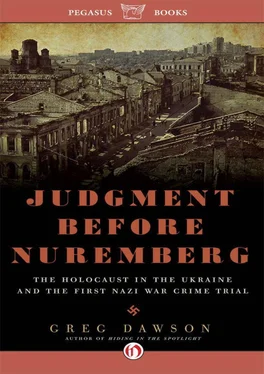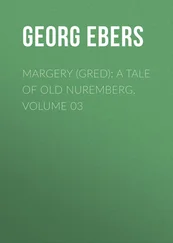Under the Nuremberg Charter, sentence reduction was the “sole prerogative” of the American Military Governor for Germany, John McCloy, former Assistant Secretary of War, who replaced General Lucius Clay in 1950. Clay had affirmed the death sentences and stoutly rebuffed all appeals, but McCloy, eager to nurture U.S.-German solidarity for the Cold War, succumbed to the deluge of demands for clemency and established an Advisory Group to review all the sentences. Subsequently, four of the convicted killers were hanged at Landsberg Prison near Munich in 1951. By 1958 all the rest, including nine men originally sentenced to death, had been set free.
Such sweeping absolution for perpetrators of the crime induces a sort of philosophical vertigo. It is difficult to put any name on this head-spinning nullification of justice other than “Holocaust denial”—perpetrated, incredibly, by representatives of the same country that went to war to stop the criminal in chief. Is it any wonder, then, that it was possible—in fact more than likely—to grow up in the American heartland in the 1950s and ’60s and know nothing of the Holocaust?
That’s the way my mother wanted it, of course—my innocence preserved—and the world cooperated by providing me with no information. Yes, I knew who Hitler was—who didn’t?—but only from capsule descriptions in grade-school texts and as the slightly ridiculous figure in grainy newsreel footage—a ranting, fist-pumping, bug-eyed lunatic who didn’t know when to stop. I also knew that Hitler killed many Jews, but more as collateral damage, it seemed, than by design.
In the absence of more and better information, my unfortunate impression of Hitler as cartoonish was reinforced by Hogan’s Heroes , a TV sitcom which hilariously satirized Nazis. Colonel Klink, the buffoonish commander of the prisoner-of-war camp, was played by Werner Klemperer, who only a few years earlier had given a fine dramatic performance as a remorseless defendant in Judgment at Nuremberg. John Banner played Sergeant Schultz, the genial, strudel-fed, risk-averse guard who repeatedly claimed, “I know nothing— nothing .” Just like me!
It was about the time Hogan’s Heroes came on the air in 1965 that I became fully aware that I was Jewish. Like the Holocaust, it may seem incredible that I would not have this crucial data. How could this be? Well, not only did we not go to church or synagogue, religion was not discussed at the dinner table. It was not verboten, just irrelevant—not as interesting to me as sports, politics, food, and the doings at the Indiana University School of Music where my mother, a pianist, and my father, a violist, were on the faculty. I also don’t recall religion being discussed outside the home—being asked by virtual strangers which church I attended, which today often comes right after “hello.” In those days people’s religion (or lack of it) was their own business. So, I had no particular reason to consider my religious or ethnic identity. I thought of myself as half Russian, half Virginian, and 100% Hoosier.
I say that as a teenager I became “fully aware” of being Jewish because I had been dimly aware of it for many years. Except for religion, ours was culturally a very Jewish home, filled with Jewish food, Jewish humor. Most of my parents’ friends, colleagues on the music faculty, were Jewish. It was a matter of putting two and two and two together—but who was counting? I don’t remember precisely when and how I learned that I was officially Jewish—there was no dramatic come-to-Jesus talk with my mother—but I considered it a diversity upgrade. No offense to my father’s English-Scotch ancestry, but Russian Jewish, with a dollop of Mongolian, added zest and exotic flair missing from the monochrome (yawn) Dawson line.
The revelation did not kindle a religious awakening for me or prompt questions that might have led to discovering my mother’s great untold story. Most children, at some point, would wonder why their mother had never spoken of her own parents. Why were there no photos? Why no stories from her childhood? I never thought to ask my mother about her parents—my phantom grandparents—perhaps because my paternal grandparents had never been part of our lives either. My father’s dad died when he was thirteen; his mother when I was very young. The absence of grandparents seemed normal.
My father, David, knew my mother’s story before he met her, from his brother, Larry, an Army lieutenant who discovered her and Frina in the displaced-persons camp he ran near Munich after the war. Beguiled by their musical gifts and fiery personalities, he pulled strings to bring them to America. Going through my mother’s papers for Hiding in the Spotlight , I found letters from Larry to my father, and a Western Union telegram alerting him to the girls’ arrival in New York in May 1946. I also found the copy of an affidavit, “Janna Dawson’s story as told to David Dawson,” submitted to a reparations board which awarded each sister $800, an amount so slight and nonsensical that it illustrates the notion of incalculable loss. I’m confident that my father would have confided my mother’s story had I asked, but I never did while living under their roof. I was twenty-five—working in Florida, a new husband and father—when he died in Bloomington at the age of sixty-two of cigarette-induced emphysema, without our ever speaking of the subject.
I might never have learned my mother’s story if not for Irwin Segelstein. It was Segelstein, head programmer for NBC in the 1970s, who had the idea for a miniseries about the Holocaust, which seemed a farfetched, costly gamble. From the early 1950s, when a camp survivor appeared on the hugely popular reality series This Is Your Life, prime time was peppered with teleplays and episodes of series such as The Twilight Zone which used Holocaust themes as background and allegory, but never explained what happened outright. Nine and a half hours of straight, unfiltered Holocaust four nights in a row was quite another thing. However, in those pre-cable days the three networks had a monopoly on viewers and money to burn, so NBC rolled the dice—and won, drawing an estimated 120 million viewers.
Holocaust followed the intersecting destinies of two fictional families, one German Jewish, the other German gentile with Nazi sympathies, against the backdrop of the unfolding cataclysm. As the first major pop-culture treatment of the Holocaust—it was the miniseries genre that put the pop in pop culture— Holocaust was not just a big TV event but a significant social and cultural milestone, like the Roots miniseries the year before.
At the time, April 1978, I was back in Bloomington working as a feature writer at The Herald-Telephone, eternally in search of fodder. Reading the massive hype surrounding the upcoming miniseries, I knew there was a story in there for me—somewhere. Perhaps my mother had some anecdotes from her wartime experience that I could spin into a piece. I phoned her in Milwaukee, where she had moved after my father’s death to join the music faculty at the University of Wisconsin-Milwaukee. Oblivious to television and pop culture, she was predictably unaware of the miniseries. I described it and asked if she could recount her own experience, hoping for enough relevant scraps to build a feature.
What followed was the most astonishing hour of my life as my mother told me, for the first time, her miraculous story of escape and survival. Not the most proficient typist, my fingers flew erratically across the keyboard, my crooked neck aching from holding the receiver to my shoulder, my mind struggling to wrap itself around the idea that it was my mother at the center of this harrowing fairy tale, improbable even by Holocaust standards. My story began with Dmitri Arshansky, my maternal grandfather, bartering for his daughter’s life.
Читать дальше












